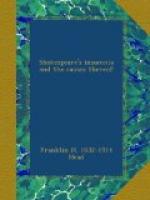“If Heaven have any grievous plague
in store
Exceeding those that I can wish upon thee,
Oh, let them keep it till thy sins be
ripe,
And then hurl down their indignation
On thee, the troubler of the poor world’s
peace!
The worm of conscience still begnaw thy
soul!
Thy friends suspect for traitors while
thou liv’st,
And take deep traitors for thy dearest
friends!
No sleep close up that deadly eye of thine,
Unless it be while some tormenting dream
Affrights thee with a hell of ugly devils!”
The witch, in “Macbeth,” cataloguing the calamities in store for the ambitious Thane, says:
“Sleep shall neither night nor day
Hang upon his pent-house lid;
He shall live a man forbid.”
It is curious also to remark, in the various lists of griefs which make life a burden and a sorrow, how often the climax of these woes is the lack of sleep, or the troubled dreams bearing their train of “gorgons, hydras, and chimeras dire,” which come with broken rest. Lady Percy says to Hotspur:—
“Why hast thou lost the fresh blood
in thy cheeks,
And given my treasures and my rights of
thee
To thick-eyed musing and curst melancholy?
Tell me, sweet lord, what is’t that
takes from thee
Thy stomach, pleasure, and thy golden
sleep?”
Macbeth says:—
“But let the frame of things disjoint,
both the worlds suffer,
Ere we will eat our meal in fear, and
sleep
In the affliction of these terrible dreams
That shake us nightly; better be with
the dead.”
In “Othello” is a striking picture of the sudden change, in the direction we are considering, which comes over a tranquil mind from the commission of a great crime. Iago says to Othello, after he has wrought “the deed without a name":—
“Not poppy nor mandragora,
Nor all the drowsy syrups of the world,
Shall ever medicine thee to that sweet
sleep
Which thou own’dst yesterday.”
The greatest punishment which comes to Macbeth after the murder of Duncan is lack of sleep. Nowhere in the language, in the same space, can be found so many pictures of the blessedness of repose as in the familiar lines:—
“Methought I heard a voice cry,
’Sleep no more!
Macbeth does murder sleep,’ the
innocent sleep;
Sleep that knits up the ravelled sleave
of care,
The death of each day’s life, sore
labor’s bath,
Balm of hurt minds, great Nature’s
second course,
Chief nourisher in life’s feast.”
And the principal reason which deters Hamlet from suicide is the fear that even if he does sleep well “after life’s fitful fever is over,” still, that sleep may be full of troubled dreams.
“To sleep, perchance to dream.
Ay, there’s the rub;
For in that sleep of death what dreams
may come
When we have shuffled off this mortal
coil,
Must give us pause.”




